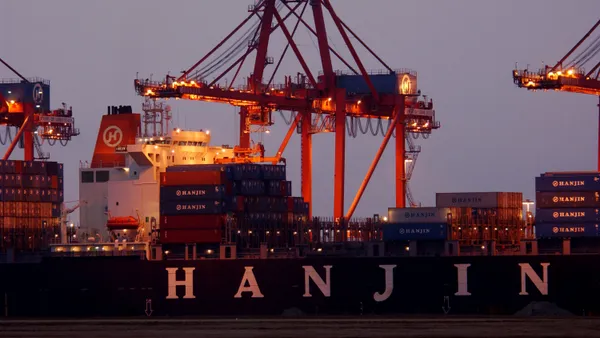Dive Brief:
- President Donald Trump signed an executive order Wednesday aimed at strengthening and repositioning the U.S.’ role in ocean shipping.
- The order, which requests multiple reports and more than 20 actions, directs government departments to create a “Maritime Action Plan” to upgrade port infrastructure, invest in workforce training and expand U.S. shipbuilding.
- Executive agencies must submit the plan within 210 days of the date of the order following legislative, financial and regulatory assessments.
Dive Insight:
The executive order is a full-scale effort to increase the U.S.’ competitiveness in global commerce and reduce its shipping dependence on other countries, including China. Currently, the U.S. produces less than 1% of global commercial ships, whereas China builds more than half, per the document.
The request for an action plan builds on several other efforts from the Trump administration to reassert the U.S.’ role in global shipping. In the past few months, Trump has pushed to decouple the Panama Canal from China and proposed a fee on China-built vessels.
The proposed fee on vessels from China has worried some trade groups and industry stakeholders, per comments collected by the Office of the U.S. Trade Representative. If finalized, it could restrict the flow of U.S. goods, while maritime service fees could reach up to $1.5 million, per the proposed rule.
Thirty percent of liner vessels on the water currently are built in China, Worldwide Shipping Council President and CEO Joe Kramek said during a Port of Los Angeles media call Friday. However, about 70% of shipbuilding orders globally are for vessels from China.
The USTR is proposing a requirement that 1% of U.S. exports be carried on U.S.-built ships, which would climb to 15% after seven years, Kramek further noted. But that provision would be difficult to comply with because those U.S.-built ships “don’t exist” and neither does the capacity to build them — at least within the given time frame, he explained.
“That’s why we're hopeful that USTR is closely considering all the comments and testimony it received, because the measures it has right now are devastatingly economically implemented on the port fee side, and impossible to comply with on the export carriage requirements on U.S. bill passes,” he said.














